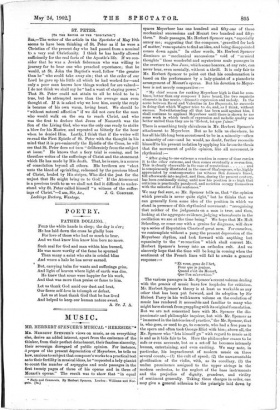ST. PETER.
[TO THZ ZDITOR OF THZ "SPECTAT0R:1
Aut,—The writer of the article in the Spectator of May 10th seems to have been thinking of St. Peter as if be were a Christian of the present day who had passed from a nominal ta a very real Christianity. I think be has hardly allowed sufficiently for the real facts of the Apostle's life. If we con- sider that be was a Jewish fisherman who was willing to journey far to hear one who preached repentance; that he would, at St. John the Baptist's word, follow "the greater than be" who could take away sin ; that at the order of our Lard he gave up his little all which be had worked for—and only a poor man knows how things worked for are valued— I do not think we shall say he" had a want of staying power." That St. Peter could not attain to all he tried to be is true, but he attempted more than the average man even thought of. If it is asked why we love him, surely the reply is because of his own warm, loving heart. We should be "without natural affection" if we did not care for the man who would walk on the sea to reach Christ, and who was the first to declare that Jesus of Nazareth was the Son of the Living God, who was the only one ready to strike a blow for his Master, and repented so bitterly for the hour when he denied Him. Lastly, I think that if the writer will re-read the First Epistle of St. Peter with the thought in his mind that it is pre-eminently the Epistle of the Cross, he will see that St. Peter does not turn "deliberately from the subject at issue." He knows that a fiery trial is coming, and be therefore writes of the sufferings of Christ and the atonement which He has made by His death. That, he is sure, is a source of consolation beyond all others. His brethren are "elect unto the blood of sprinkling, redeemed by the precious blood of Christ, healed by His stripes, Who died the just for the unjust that He might bring us to God." If the Atonement is a precious truth to us we shall not find it difficult to under- stand why St. Peter called himself "a witness of the suffer- ings of Christ."—I am, Sir, &c., J. G. CORNISH. Lockinge Rectory, Wantage.






































 Previous page
Previous page